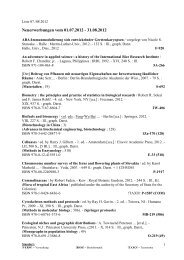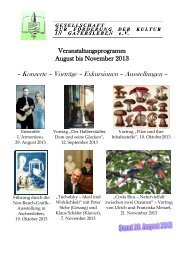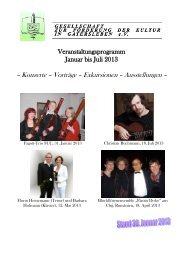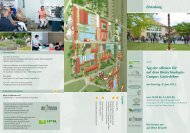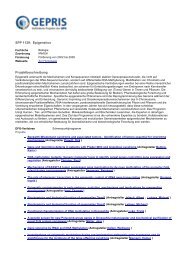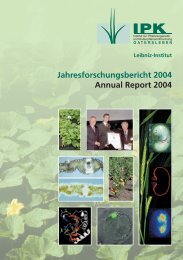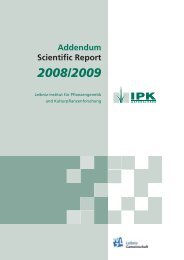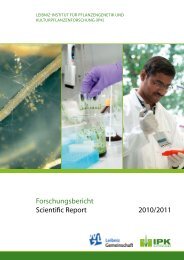Research Group - IPK Gatersleben
Research Group - IPK Gatersleben
Research Group - IPK Gatersleben
Create successful ePaper yourself
Turn your PDF publications into a flip-book with our unique Google optimized e-Paper software.
Abteilung Genbank/Department of Genebank<br />
<strong>Research</strong> <strong>Group</strong>:<br />
External Branch “North”<br />
Head: Dr. Klaus J. Dehmer<br />
Scientists<br />
<strong>IPK</strong> financed<br />
Willner, Evelin (P)<br />
Goals<br />
Collection, conservation, characterisation, evaluation,<br />
service, documentation and research activities of/on<br />
potato, oil and forage crop plant genetic resources.<br />
<strong>Research</strong> Report<br />
Within three collections − clonally propagated genotypes<br />
of Andean or equatorial origin (AKS; 490 entries, mainly<br />
seven cultivated species), ,590 cultivars and breeding<br />
lines of Solanum tuberosum ssp. tuberosum (KKS, vegetatively<br />
propagated) and ,859 accessions of 139 wild and<br />
cultivated species from Central and South America (WKS,<br />
propagated as populations via seeds); the Groß Lüsewitz<br />
Potato Collections (GLKS; K.J. Dehmer) contain a total of<br />
5,945 accessions and 140 species. 1,161 genebank accessions<br />
were distributed to 177 requestors, 15 coming from<br />
foreign countries (71 accessions shipped).<br />
In 007, 63 AKS and 609 KKS accessions were cultivated<br />
and characterised in the field with ten plants each, and<br />
6 WKS accessions (194 from seedlings, 3 from tubers)<br />
were sexually propagated in the greenhouse. Via in vitro<br />
cultivation, , 7 KKS and 490 AKS accessions are maintained,<br />
while more than 1,000 KKS entries are cryopreserved<br />
at <strong>Gatersleben</strong> (research group In vitro Storage<br />
and Cryopreservation).<br />
According to the respective ELISA tests, 2,508 in vitro<br />
samples are free of the six most common potato viruses.<br />
The Plant Protection Offices at Hannover and Rostock<br />
tested GLKS potato material for quarantine viruses (330<br />
accs.), quarantine bacteria (349), and PSTVd (586).<br />
Evaluations were carried out for resistance to Globodera<br />
pallida (43 WKS accessions/ 03 genotypes, State Plant<br />
Protection Office Rostock) and Phytophthora infestans<br />
on tubers (91 WKS accessions/449 genotypes; BAZ/ILK).<br />
Tubers of 39 KKS entries were cultivated for the evaluation<br />
of their taste, while tuber material of 4 selected accessions<br />
was propagated for a stability research project.<br />
In the greenhouse, 40 WKS accessions with ten genotypes<br />
each were grown for the production of tubers to be used<br />
48<br />
in potato wart resistance tests and as base material for<br />
protoplast fusions within the KOSY project (BBA, Phytowelt).<br />
Regarding research on duplicate identification within<br />
the KKS, efforts to homologise SSR marker sets for germplasm<br />
characterisations on an international level were<br />
continued.<br />
The Oil Plants and Forage Crops Collections at Malchow<br />
(E. Willner) maintain 14,089 accessions ( ,455 samples of<br />
oil plants, 10,407 forage grasses, 1, 7 forage legumes).<br />
A further increase in the number of accessions resulted<br />
from the transfer of varieties no longer listed on the official<br />
variety list from the Federal Seed Board (Bundessortenamt)<br />
to Malchow (48 cultivars). In 007, a total of 1,330<br />
accessions were cultivated, either for multiplication (738)<br />
and/or characterisation (488) or evaluation (104).<br />
Germination tests were conducted for 1,744 accessions.<br />
According to FAO genebank standards, 54 % of the whole<br />
Malchow collection is stored as an active and base collection<br />
with safety duplicates at <strong>IPK</strong> <strong>Gatersleben</strong> (7,673 accessions),<br />
while 81 % of the whole collection is available<br />
for seed requests. A total of 554 samples were provided<br />
to 36 users, whereof 19 seed deliveries with 408 samples<br />
were for foreign countries.<br />
Characterisations were performed on 1,14 grass accessions,<br />
64 samples of rape, mustard or forage kale accessions<br />
for an initial description of their morphological<br />
and phenological traits as well as for the confirmation of<br />
their botanical classification. Field evaluations were carried<br />
out for Lolium perenne (81 accessions); 50 accessions<br />
collected from different European countries and 31 breeding<br />
lines were analysed for trait variability and/or green<br />
matter yield.<br />
For the Genebank management processes that are supported<br />
by the Genebank Information System (GBIS/M),<br />
data were further consolidated (collaboration with M.<br />
Oppermann, H. Knüpffer, U. Lohwasser, research group<br />
Genebank Documentation, research group Resources Genetics<br />
and Reproduction).<br />
The European Central Poa Database (http://poa.ipkgatersleben.de)<br />
was further advanced, containing passport<br />
data of 5, 16 accessions from 38 Poa species (in collaboration<br />
with S. Weise, research group Bioinformatics<br />
and Information Technology). These originate from<br />
56 different countries and are maintained at 1 institutes<br />
in 18 European countries. Progress was made in<br />
the identification of “Originality” and “Primary Holder”<br />
matters, which will allow to avoid unnecessary regenerations<br />
and to improve the sharing of responsibilities.<br />
As a result of a former and joint Lolium project with the<br />
research group Genome Diversity, both E. Willner and<br />
K.J. Dehmer contributed essentially to the development<br />
of a Diversity Study Toolkit (DiSTo) for a combined and<br />
web-based analysis of passport, characterisation, evaluation<br />
and molecular data by the Plant Data Warehouse<br />
group.



